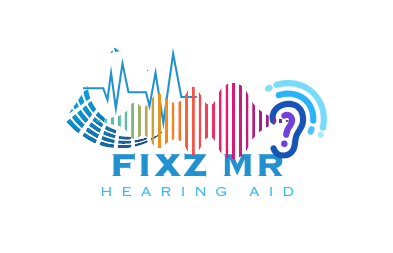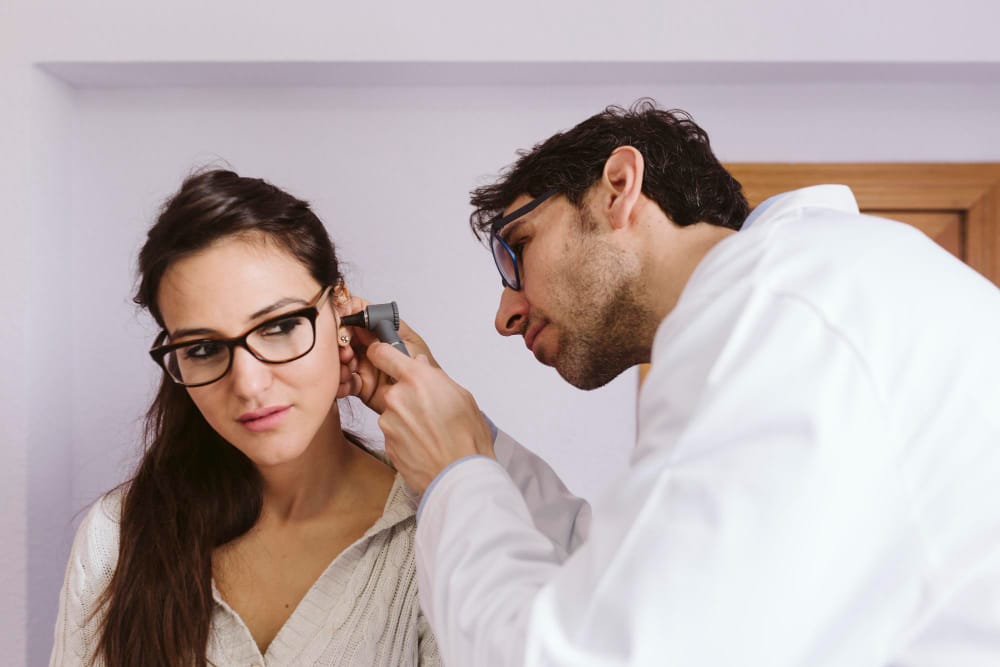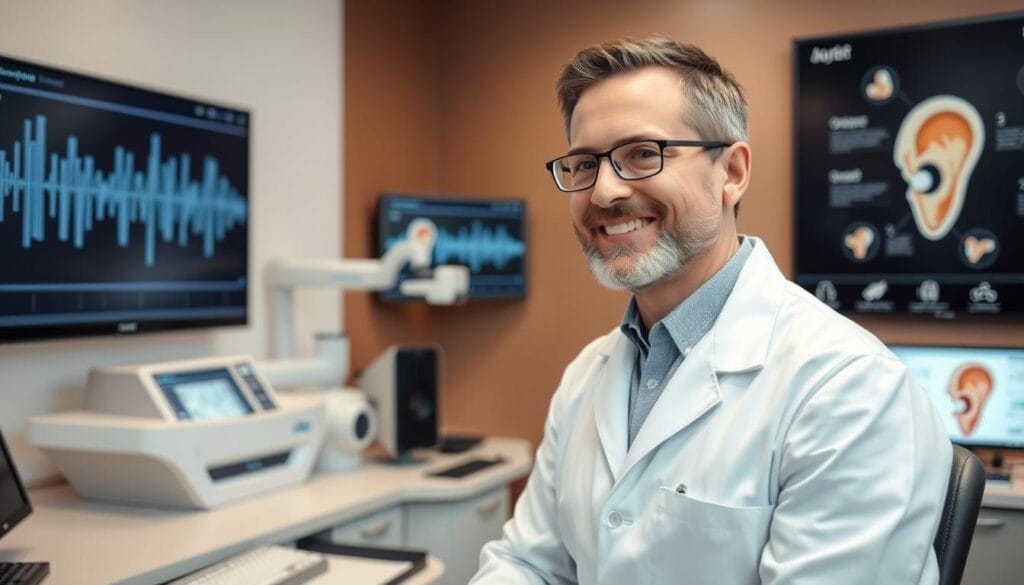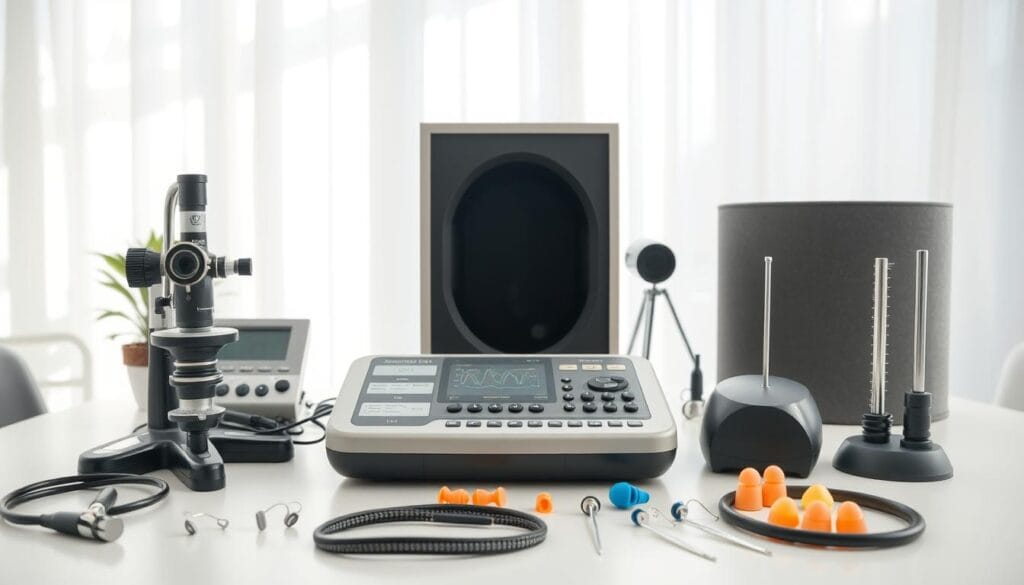Audiologists are hearing health experts who manage hearing and balance issues. They might be called ‘Doctor’ because of their Doctor of Audiology (AuD) degree. But, many ask, “are audiologists doctors?” like medical doctors. They have a deep knowledge of hearing sciences but their job is different.
They diagnose hearing problems, create treatment plans, and help with hearing aids. This is what they do best.
About 2.8 million U.S. adults have hearing loss, which audiologists help with. To become an audiologist, one needs a lot of training. This includes an AuD degree, over 300 hours of practice, and passing a national exam.
Time Magazine named audiology a top career in 2015. It’s a vital service that also offers great job satisfaction and growth.
Key Takeaways
- Audiologists, though healthcare professionals, are not medical doctors.
- The role of an audiologist is multifaceted, involving diagnostics, treatment, and educational services relating to hearing and balance.
- With an aging population and medical advancements, the need for audiologists is expanding notably.
- Specializations within audiology, including pediatric and occupational hearing loss, provide diverse career pathways.
- The pathway to becoming an audiologist involves obtaining a Doctor of Audiology degree, certification, and state licensure.
- Engagement with patients, compassion, clear communication, and problem-solving are critical skills in the audiologist job description.
- Audiologists work in a variety of environments, adapting to the unique needs of their patients.
Audiologist Credentials and Qualifications
To become a certified audiologist, one must meet certain audiologist education requirements. Audiologists are healthcare experts who diagnose and treat hearing and balance issues. They need a lot of education and clinical training because of the complexity of hearing health.
First, you need a bachelor’s degree in communication sciences or biology. Then, you get a doctoral degree in audiology (AuD). This degree gives you a deep understanding of hearing treatments and technologies.
Defining the Audiologist: Education and Certification Requirements
To be a licensed audiologist, you must complete tough education and get certified. Before, a master’s degree was enough. Now, a Doctor of Audiology (AuD) is required. This change shows the field’s growth and need for more training.
Certified audiologists need to pass exams and gain practical experience. They do internships or residencies in hospitals and private clinics. Getting a Certificate of Clinical Competence in Audiology (CCC-A) shows they are very skilled in hearing care.
From AuD to CCC-A: Navigating the Abbreviations in Audiology
In audiology, AuD and CCC-A are important. AuD means you have a doctoral degree in audiology. It shows you’ve had deep academic and clinical training in hearing disorders. CCC-A means you’re a certified audiologist who meets high field standards.
These standards help keep audiologists up-to-date with the latest treatments. The American Academy of Audiology recommends ongoing education. This ensures audiologists can offer the best care.
Knowing about an audiologist’s credentials helps patients choose the right professional. As hearing aid technology gets better, having a qualified audiologist is more important than ever.
Comparing Audiologists to Medical Doctors
It’s important to know the difference between an audiologist and a doctor, especially ENT physicians or otolaryngologists. Audiologists and ENTs both play key roles in ear health. But they have different training and areas of focus.
Understanding the Distinctions: Audiologists and ENT Physicians
The main difference between audiologist and doctor is their roles. Audiologists are trained to deal with hearing and balance problems. They do hearing tests and help with tinnitus and hyperacusis.
ENT physicians have more training and handle a wider range of health issues. They do surgeries for ear, nose, and throat problems. Their training lets them handle serious cases that audiologists can’t.
Audiologists might suggest hearing aids for age-related hearing loss. But if there’s severe damage or tumors, ENT doctors do the surgery. Audiologists focus on non-invasive treatments and early diagnosis. If a case needs more, they refer patients to an ENT physician.
Audiologists’ Scope of Practice Versus Medical Professionals
Audiologists are hearing health professionals who deal with hearing and balance issues. They use non-surgical methods for diagnosis and treatment. They also fit and maintain hearing aids and offer communication strategies.
ENT physicians treat a wider range of problems like infections and facial trauma. They handle complex cases that need surgery or specialized care.
Audiologists and ENTs work together to give patients the best care. Knowing their roles helps direct patients to the right specialist. For more on hearing disorders like single-sided deafness, visit this informative link.
Are Audiologists Doctors?
When we talk about audiologists, we often wonder if they are doctors. The question do audiologists have a doctorate is a big one. In the United States, to work as an audiologist, you need a Doctor of Audiology (AuD) degree. This shows they are experts in hearing science.
The Doctor of Audiology (AuD): A Closer Look at the Degree
The Doctor of Audiology (AuD) is the top degree in audiology. It takes four years after college to get. This degree makes audiologists doctors specializing in audiology.
Audiologists are key in finding hearing problems in kids. They do tests to check hearing. With their audiologist medical degree, they can give detailed care and new treatments.
The Audiologist’s Role: Doctorate-Level Expert or Healthcare Provider?
Audiologists are both doctoral-level professionals and healthcare providers. They are trained well and know a lot. They work in many places, like hospitals and clinics.
They work with other doctors and therapists. This team effort helps with hearing and balance problems. Audiologist as doctors teach patients about hearing and help with hearing loss. They do more than just tests; they also give advice and help with hearing aids.
| Education Level | Settings | Annual Salary Range |
|---|---|---|
| Bachelor’s + AuD | Hospitals, Private Practices | $60K – $200K |
| Ph.D. in Audiology | Universities, Research Institutions | $70K – $150K |
| Master’s in Audiology (Before 2007) | Education Centers, Rehabilitation Facilities | $50K – $120K |
Audiologists are very important in healthcare. They keep pushing the limits of hearing and balance therapy.
The Range of Audiologist Specializations
Audiologists deal with a wide range of needs. They help infants and young children in pediatric audiology. They also focus on older adults in geriatric hearing health. This shows how audiologists help with hearing and balance issues at all ages.
Knowing about these areas is key for patients and future audiologists. Audiologists greatly improve patients’ lives. They are crucial hearing loss experts in our communities.
Pediatric to Geriatric: Audiologists’ Diverse Patient Demographics
In pediatric audiology, care starts with newborn screenings. It helps kids with hearing issues to speak and learn normally. On the other hand, geriatric hearing health deals with hearing loss in older adults. Audiologists use cochlear implants and other devices to help them communicate better.
Exploring Audiologist Subfields: Balance Disorders, Cochlear Implants, and More
Audiologists also work on balance disorders like dizziness. They use advanced technologies like cochlear implants. This shows how audiology treatments keep getting better.
| Audiologist Subfield | Key Focus Area |
|---|---|
| Pediatric Audiology | Diagnosis and treatment of hearing disorders in children |
| Geriatric Audiology | Management of age-related hearing loss |
| Vestibular Audiology | Specialization in balance disorders |
| Cochlear Implants Specialists | Implantation and post-operative care |
For more on specialized audiologists, check out this link. It gives a detailed look at their roles and how they adapt to different patients’ needs.
A Day in the Life of an Audiologist
In the world of healthcare, audiology professionals play a key role. Their day is filled with various tasks, from consultations to hearing healthcare research. They use advanced tools and technology in their work, making their career both challenging and rewarding.
The Audiologist’s Toolkit: Instruments and Technologies Utilized
Audiologist tools and hearing specialist equipment are crucial for patient care. They use everything from audiometers for basic tests to complex software for diagnosing issues. They also fit hearing aids and provide custom ear protection, helping patients hear better.
At Eldorado Audiology and Hearing Center, technology and expertise come together. This approach greatly improves patients’ lives. For more on how technology helps treat hearing conditions, check out effective medications for hearing loss.
Preventive Care to Innovative Research: An Audiologist’s Multifaceted Career
An audiologist career goes beyond clinical work. They focus on preventive care and education. They also run hearing conservation programs, teaching about the dangers of loud noises.
Moreover, audiologists are key in hearing healthcare research. Their work leads to new ways to diagnose and treat hearing problems. This not only helps patients but also advances the field of hearing health professionals.
| Audiologist Activity | Tools Used | Impact on Patient Care |
|---|---|---|
| Hearing and Balance Tests | Audiometers, Vestibular testing equipment | Accurate diagnosis of hearing and balance disorders |
| Hearing Aids Fitting | Real-ear measurement systems | Customized auditory experience, improved speech understanding |
| Research and Development | Advanced software, Clinical trial databases | Enhancements in treatment options, evidence-based practices |
The life of an audiologist is a mix of precision, technology, and dedication to hearing health. Their work with audiologist tools and research shows the importance and complexity of their role in healthcare.
Conclusion
Audiologists are key experts in hearing health. They diagnose and treat hearing and balance problems. They have a lot of knowledge and skills from their education and training.
They need at least a master’s degree and sometimes a doctorate. They also do a clinical externship and get registered with the Health Care and Professionals Council (HCPC). This makes them true audiology specialists.
Audiologists do more than just check hearing. They also help with balance and offer rehabilitation. They are doctors who make a big difference in people’s lives.
They use special training and help people get used to hearing aids. Early diagnosis and hearing aids are important. Audiologists also support patients with severe hearing loss.
As people learn more about hearing care, audiologists play an even bigger role. They work with the latest technology from brands like Jabra Enhance, Eargo, and Audien. For more information, check out ‘Understanding Audiologists and Audiology’.
Audiologists are dedicated to their work. They change lives and are important for our hearing health. They are caring and vital to our well-being.










